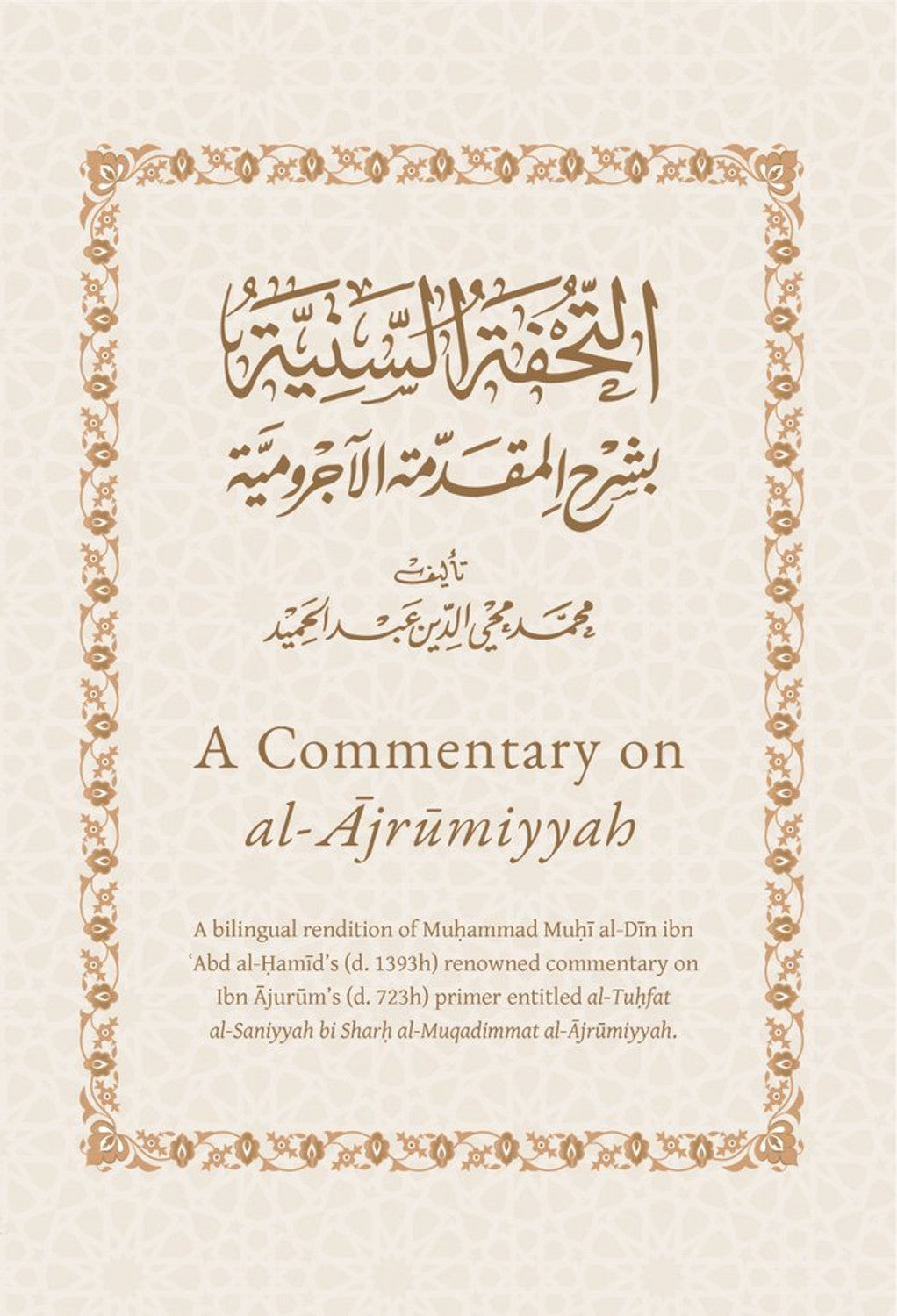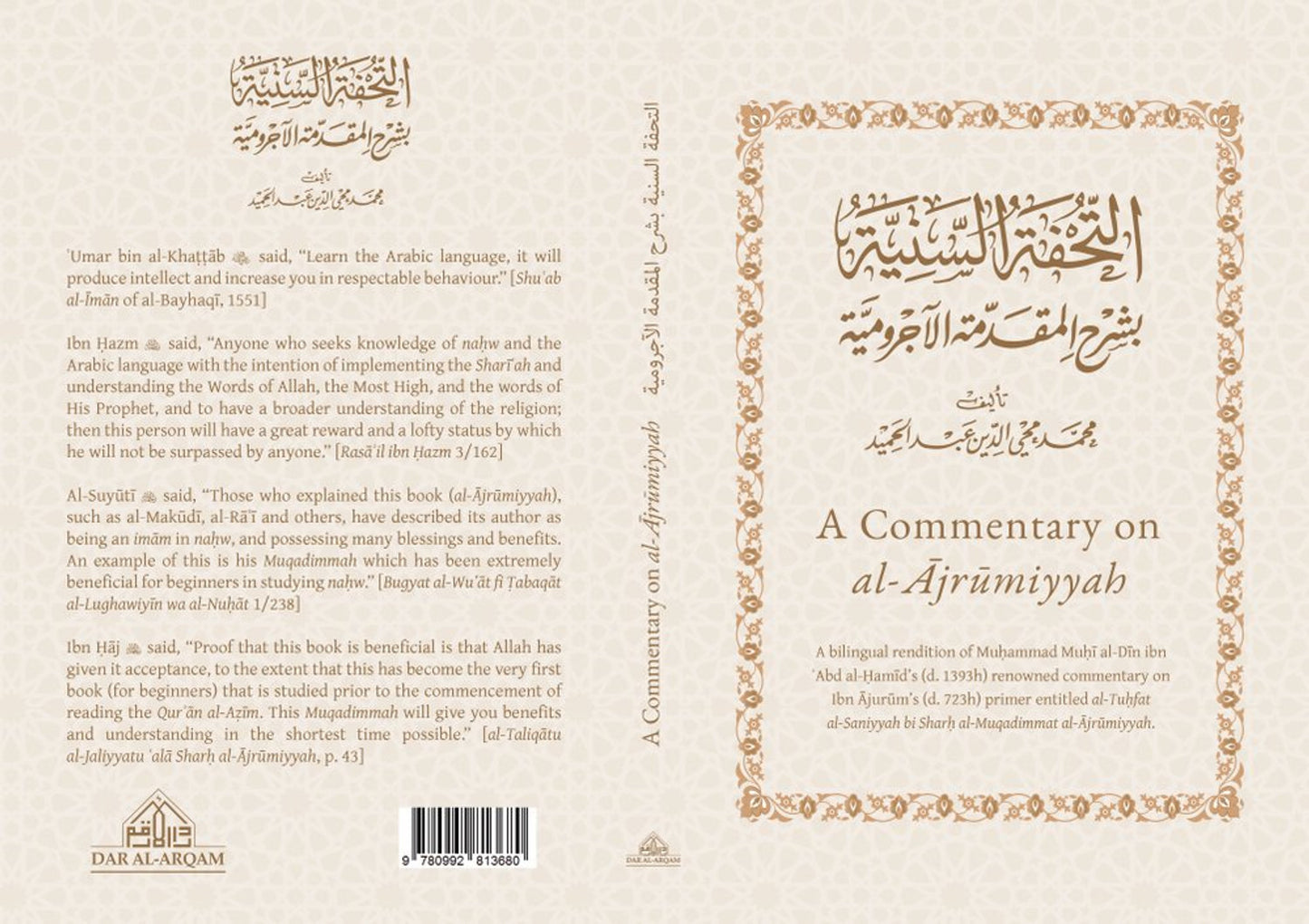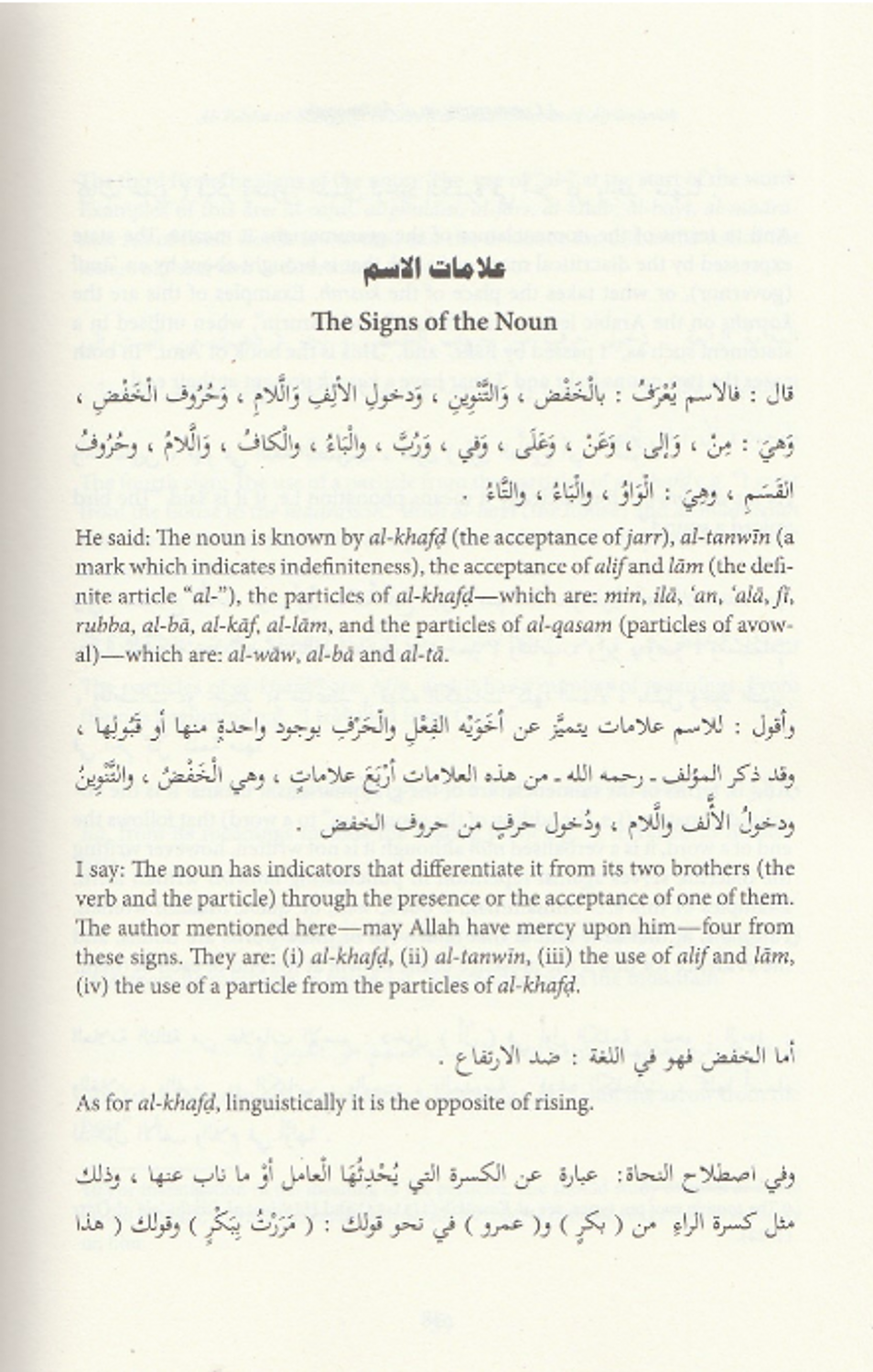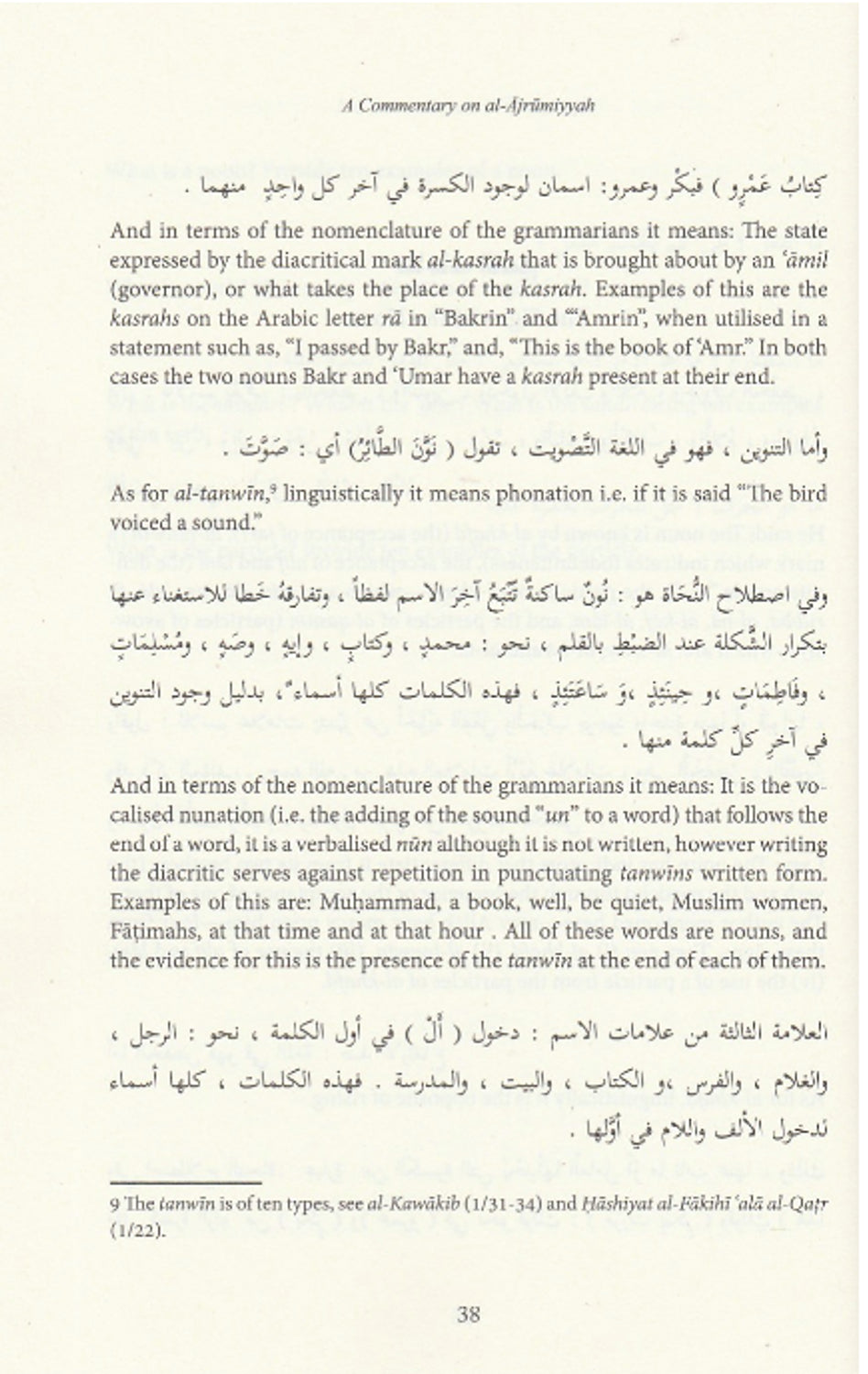A Commentary on al-Ajrumiyyah: A Bilingual Rendition of al-Tuhfat al-Saniyyah
A Commentary on al-Ajrumiyyah: A Bilingual Rendition of al-Tuhfat al-Saniyyah
Publisher:
Al safary publisher'
Author:
Muhammad Muhi al-Din ibn 'Abd al-Hamid
Language:
English
Binding:
Soft Cover
Pages: 408
Size: 16x24
Couldn't load pickup availability




Collapsible content
Description of Book
A full bilingual rendition of Muḥammad Muḥī al-Dīn ibn ʿAbd al-Ḥamīd’s (d. 1393h) renowned commentary on Ibn Ājurūm’s (d. 723h) primer entitled al-Tuḥfat al-Saniyyah bi Sharḥ al-Muqadimmat al-Ājrūmiyyah with supplementary notes from other commentaries. ʿUmar bin al-Khaṭṭāb (ra) said, “Learn the Arabic language, it will produce intellect and increase you in respectable behaviour.” [Shuʿab al-Īmān of al-Bayhaqī, 1551] Ibn Ḥazm said, “Anyone who seeks knowledge of naḥw and the Arabic language with the intention of implementing the Sharīʿah and understanding the Words of Allah, the Most High, and the words of His Prophet, and to have a broader understanding of the religion; then this person will have a great reward and a lofty status by which he will not be surpassed by anyone.” [Rasāʾil ibn Ḥazm 3/162] Al-Suyūtī said, “Those who explained this book (al-Ājrūmiyyah), such as al-Makūdī, al-Rāʿī and others, have described its author as being an imām in naḥw, and possessing many blessings and benefits. An example of this is his Muqadimmah which has been extremely beneficial for beginners in studying naḥw.” [Bugyat al-Wu’āt fi Ṭabaqāt al-Lughawiyīn wa al-Nuḥāt 1/238] Ibn Ḥāj said, “Proof that this book is beneficial is that Allah has given it acceptance, to the extent that this has become the very first book (for beginners) that is studied prior to the commencement of reading the Qurʾān al-Aẓīm. This Muqadimmah will give you benefits and understanding in the shortest time possible.” [al-Taliqātu al-Jaliyyatu ʿalā Sharḥ al-Ājrūmiyyah
Publisher
Al safary publisher'
Author
- Muhammad Muhi al-Din ibn 'Abd al-Hamid
Sample Pages - Content
Page:01
التحفة السنية شرح المقدمته الآجرومية
تأليف
محمد محی الدین عبد الحميد
A Commentary on al-Ajrumiyyah
A bilingual rendition of Muhammad Muḥī al-Din ibn 'Abd al-Ḥamid's (d. 1393h) renowned commentary on Ibn Ajurum's (d. 723h) primer entitled al-Tuhfat al-Saniyyah bi Sharh al-Muqadimmat al-Ajramiyyah.
Page:02
التحفة السنية بشرح المقدمة الآجرومية
تابت
مهم در محی الدین عبد الحميد
'Umar bin al-Khattab
said, "Learn the Arabic language, it will
produce intellect and increase you in respectable behaviour." [Shu'ab al-Iman of al-Bayhaqi, 1551]
Ibn Hazm said, "Anyone who seeks knowledge of nahw and the Arabic language with the intention of implementing the Shariah and understanding the Words of Allah, the Most High, and the words of His Prophet, and to have a broader understanding of the religion; then this person will have a great reward and a lofty status by which he will not be surpassed by anyone." [Rasa il ibn Hazm 3/162]
Al-Suyūtī said, "Those who explained this book (al-Ajrumiyyah), such as al-Makūdī, al-Rai and others, have described its author as being an imam in nahw, and possessing many blessings and benefits. An example of this is his Muqadimmah which has been extremely beneficial for beginners in studying nahw." [Bugyat al-Wu'ät fi Tabaqat al-Lughawiyin wa al-Nuḥat 1/238]
Ibn Haj said, "Proof that this book is beneficial is that Allah has given it acceptance, to the extent that this has become the very first book (for beginners) that is studied prior to the commencement of reading the Qur'an al-Azim. This Muqadimmah will give you benefits and understanding in the shortest time possible." [al-Taliqātu al-Jaliyyatu 'ala Sharḥ al-Ajrumiyyah, p. 43]
DAR AL-ARQAM
التحفة السنية بشرح المقدمة الآجرومية A Commentary on al-Ajramiyyah
9 780992 813680
DAR AL-ARQAM
التحفة السنية بشرح المقدمة الآجرومية
تأليف
محمد محي الدين عبد الحميد
A Commentary on al-Ajrumiyyah
A bilingual rendition of Muhammad Muḥī al-Din ibn 'Abd al-Hamid's (d. 1393h) renowned commentary on Ibn Ajurüm's (d. 723h) primer entitled al-Tuhfat al-Saniyyah bi Sharh al-Muqadimmat al-Ajrumiyyah.
Page:03
علامات الاسم
The Signs of the Noun
قال : فالاسم يُعْرَفُ : بالْخَفْض ، وَالتَّنْوِينِ ، ودخول الألِفِ وَاللام ، وَحُرُوف الْخَفْضِ ، وَهيَ : مِنْ ، وَإلى ، وَعَنْ ، وَعَلَى ، وَفِي ، وَرُبَّ ، والْبَاءُ ، والكافُ ، وَاللام ، وحُرُوفُ
القسم ، وهي : الْوَاوُ ، والْبَاءُ ، والتَّاءُ
He said: The noun is known by al-khafd (the acceptance of jarr), al-tanwin (a mark which indicates indefiniteness), the acceptance of alif and lam (the defi- nite article "al-"), the particles of al-khafd-which are: min, ilà, 'an, 'ala, fi, rubba, al-bā, al-kaf, al-lam, and the particles of al-qasam (particles of avow- al)-which are: al-waw, al-ba and al-tä.
وأقول : للاسم علامات يتميز عن أَخَوَيْه الفِعْلِ والحَرْفِ بوجود واحدةٍ منها أو قبولها ، هذه العلامات أربع علامات ، وهي الْخَفْضُ ، والتَّنْوِينُ الله - من - رحمه وقد ذكر المؤلف .
ودخول الألف واللام ، ودخول حرف من حروف الخفض
I say: The noun has indicators that differentiate it from its two brothers (the verb and the particle) through the presence or the acceptance of one of them. The author mentioned here-may Allah have mercy upon him-four from these signs. They are: (i) al-khafḍ, (ii) al-tanwin, (iii) the use of alif and lam, (iv) the use of a particle from the particles of al-khafd.
أما الخفض فهو في اللغة : ضد الارتفاع
As for al-khafd, linguistically it is the opposite of rising.
وفي اصطلاح النحاة عبارة عن الكسرة التي يُحْدِثُها العامل أو ما ناب عنها ، وذلك مثل كسرة الراء من ( بكر ) و ( عمرو ) في نحو قولك : ( مَرَرْتُ بِبَكْرٍ ) وقولك ( هذا
Page:04
A Commentary on al-Ajrumiyyah
كتاب عَمْرٍو ) فيكر وعمرو : اسمان لوجود الكسرة في آخر كل واحد منهما
And in terms of the nomenclature of the grammarians it means: The state expressed by the diacritical mark al-kasrah that is brought about by an 'amil (governor), or what takes the place of the kasrah. Examples of this are the kasrahs on the Arabic letter ra in "Bakrin" and "Amrin", when utilised in a statement such as, "I passed by Bakr," and, "This is the book of 'Amr." In both cases the two nouns Bakr and 'Umar have a kasrah present at their end.
وأما التنوين ، فهو في اللغة التصويت ، تقول ( نَوَّنَ الطَّائِرُ) أي : صَوَّتَ .
As for al-tanwin,' linguistically it means phonation i.e. if it is said "The bird voiced a sound."
وفي اصطلاح النحاة هو : نون ساكنة تتبَعُ آخِرَ الاسم لفظاً ، وتفارقه خطا للاستغناء عنها بتكرار الشكلة عند الضبطِ بالقلم ، نحو : محمد ، وكتاب ، وإيه ، وصه ، ومُسْلِمَاتٍ
، وفاطِمَاتٍ ، و حِينَئِذٍ ، وَ سَاعَتَئِذٍ ، فهذه الكلمات كلها أسماء"، بدليل وجود التنوين في آخر كل كلمة منها
And in terms of the nomenclature of the grammarians it means: It is the vo- calised nunation (i.e. the adding of the sound "un" to a word) that follows the end of a word, it is a verbalised nun although it is not written, however writing the diacritic serves against repetition in punctuating tanwins written form. Examples of this are: Muhammad, a book, well, be quiet, Muslim women, Fatimahs, at that time and at that hour. All of these words are nouns, and the evidence for this is the presence of the tanwin at the end of each of them.
علامات الاسم : دخول ( أل ) في أول الكلمة ، نحو : الرجل ، العلامة الثالثة من والغلام ، والفرس ، و الكتاب ، والبيت، والمدرسة . فهذه الكلمات ، كلها أسماء تدخول الألف واللام في أولها
9 The tanwin is of ten types, see al-Kawakib (1/31-34) and Hashiyat al-Fakihi 'ala al-Qatr (1/22).




